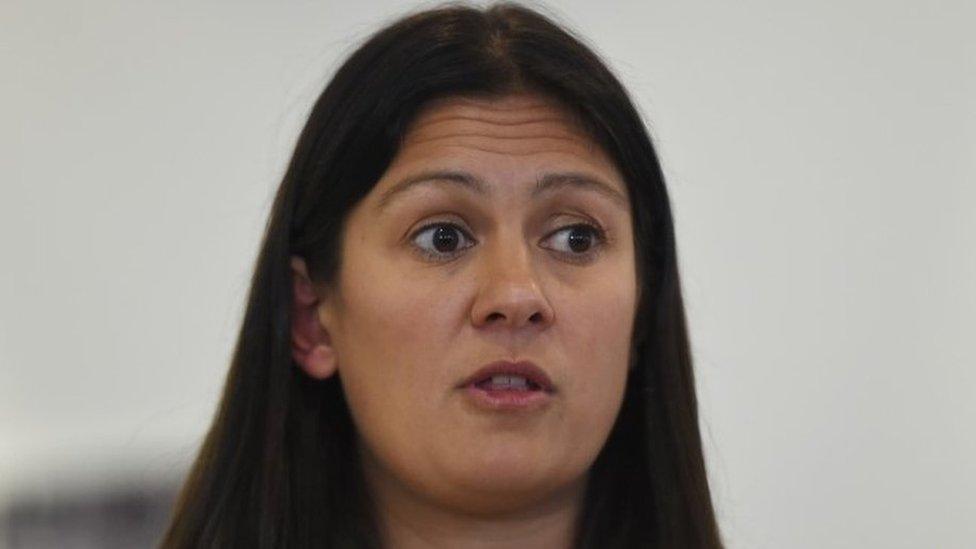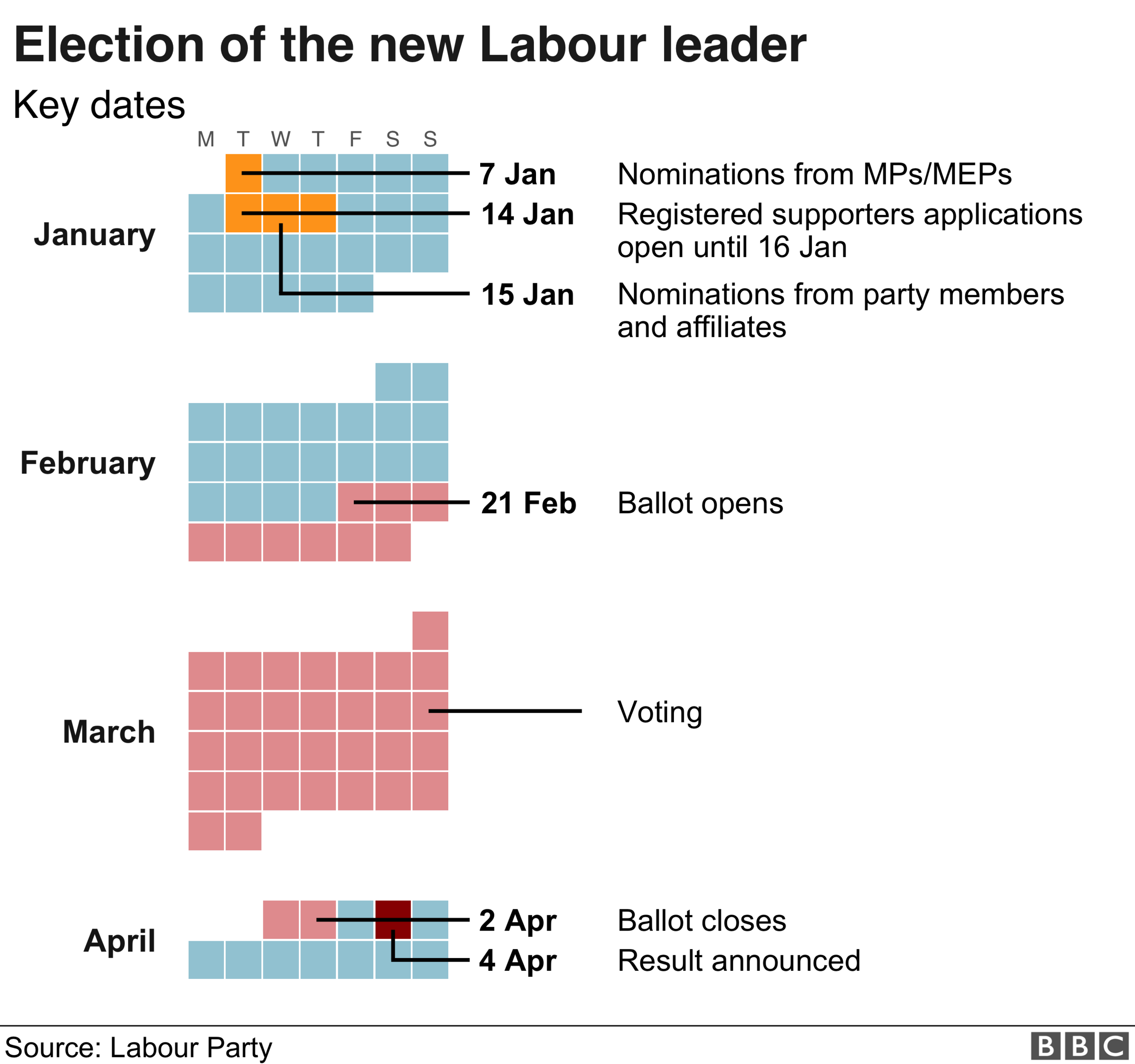Labour leadership: Candidates seek union backing in next phase of contest
- Published
- comments

Ms Nandy has won the backing of the National Union of Mineworkers
Labour leadership hopefuls are seeking the backing of unions and local parties as the contest's next stage begins.
The five contenders need the support of 5% of local parties or at least three affiliates - two must be unions - by 14 February to make the final ballot.
The National Union of Mineworkers (NUM) said it would be backing Lisa Nandy.
And SERA, an environmental campaign group affiliated to the party, has said it is supporting Sir Keir Starmer, who already has the backing of Unison.
Other unions, such as Unite and the GMB, have yet to make up their minds.
Jeremy Corbyn's successor as Labour leader will be announced on 4 April. He is stepping down after Labour's defeat in December's general election, its fourth election defeat in a row.
In the first phase of the contest, Sir Keir won the backing of most MPs and MEPs, well ahead of Rebecca Long-Bailey, Ms Nandy, Jess Phillips and Emily Thornberry. Clive Lewis pulled out after failing to secure enough support.
'Crucial moment'
The NUM said it was backing Wigan MP Ms Nandy because "she represents a coalfield community and has stood with us in our fights for justice and regeneration".
The union, whose membership has shrunk considerably since its heyday in the 1970s and 1980s, said it was "confident she is the leader who can take Labour back into government once again".
Lisa Nandy on student fees, the NHS, Trident and tax
In an interview with the BBC's Andrew Neil, Ms Nandy said Labour members would have to make the "brave choice" and not "play it safe" when it came to electing their next leader.
She said she had fought many battles before entering Parliament and since, making her a good candidate to be next prime minister.
She said she would abolish tuition fees, renationalise Royal Mail and renew Trident - Britain's nuclear deterrent - "if it was coupled with a strong commitment to multi-lateral disarmament".
Ms Nandy also said she did not support another Scottish independence referendum, saying: "I think this country has had enough of referendums."
Four candidates remain in the race for the Labour leadership
Elsewhere, in a speech on Wednesday, Ms Nandy criticised Mr Corbyn for his response to Russia's alleged involvement in the poisoning of British citizens in Salisbury in 2018, saying he was "completely wrong" to have called for dialogue after the events.
"At a crucial moment, we hesitated in condemning an authoritarian regime... that used chemical weapons on the streets of the UK," she said.
She also said the UK should refuse to sign a trade deal with the US unless it signs back up to the Paris climate deal, which President Trump withdrew from in 2017.

The Socialist Environment and Resources Association (SERA) said it was backing Sir Keir because he had "consistently supported" its positions.
These included "opposing the expansion of Heathrow airport, standing up to protect environmental legislation in the Brexit debate, and campaigning with us on air quality," it added.
Sir Keir said he was "delighted" to receiving the backing and added: "If elected Labour leader, I will make tackling climate change our number one priority and hard-wired into everything we do."
In an article for the Guardian, external, he said Labour could win again if the party made the case for "moral socialism that is relevant to people's everyday lives".
He added that this should include a "new economic model" to replace free-market economics, and "radical devolution of power to our nations, regions, towns and cities".
When the final leadership ballot opens on 21 February, members of the Labour Party, the 12 affiliated trades unions (if they opt in), and 20 socialist societies such as the Fabians, Labour Housing Group and Jewish Labour Movement, all get one vote each.
Those who join the party or become affiliated supporters before 20 January will be eligible to vote. Registered supporters - who are not full party members - can also take part if they pay £25 by the 16 January deadline.

Where will union votes go?

Not all five candidates are likely to get union backing.
Sir Keir got an early boost when the UK's biggest union, Unison, declared their support. He is likely to get the second required trade union - possibly Community, or the shopworkers union Usdaw, or indeed both.
While Lisa Nandy has won the backing of the now rather emaciated NUM, there is a further barrier to be overcome.
The unions and affiliates which nominate must represent 5% of the affiliated membership. In practice, this means she needs also to get a much, much bigger union on side.
Who decides on the next Labour leader?
The GMB is such a union. It nominated the challenger to Jeremy Corbyn, Owen Smith, in 2016 and is unlikely to back Rebecca Long-Bailey, who is seen as too close to the current leadership.
But it's not clear if they'll opt for Nandy or Starmer and its executive will hear from all of the candidates before making a choice next week.
But Nandy's supporters are hopeful the GMB, with many public service workers amongst the membership, will choose a woman who represents a northern English seat.
The executive of the vast Unite union will make its decision on 24 January. The expectation is that, given its left-wing leadership, it will opt for Long-Bailey. But several sources are suggesting support for Nandy shouldn't be completely ruled out.
So far, then, it looks as though three candidates could make the membership ballot via the union route.
That would leave Jess Phillips and Emily Thornberry fighting a longer battle to get the backing of local parties - probably in the face of resistance from the left-wing grassroots group, Momentum.
This will require a high degree of local organisation and sufficient funding to drum up support of the 33 local parties needed, amongst an overall membership of about half a million.
They have until Valentine's Day to do so.
It's not clear yet if they'll love the result - or if their campaigns will end in heartbreak.
